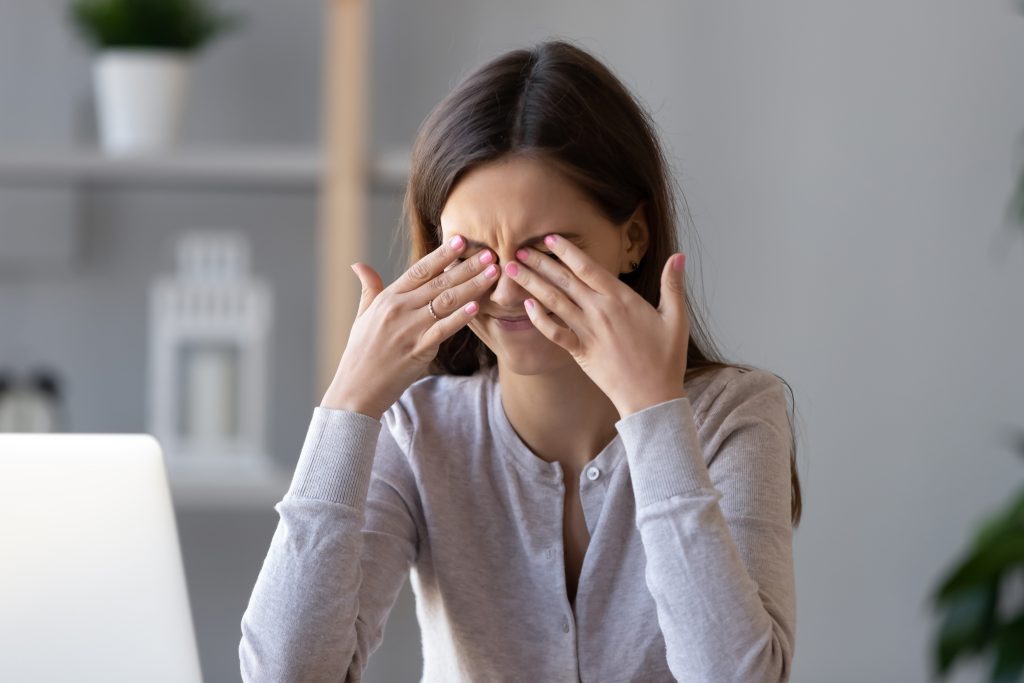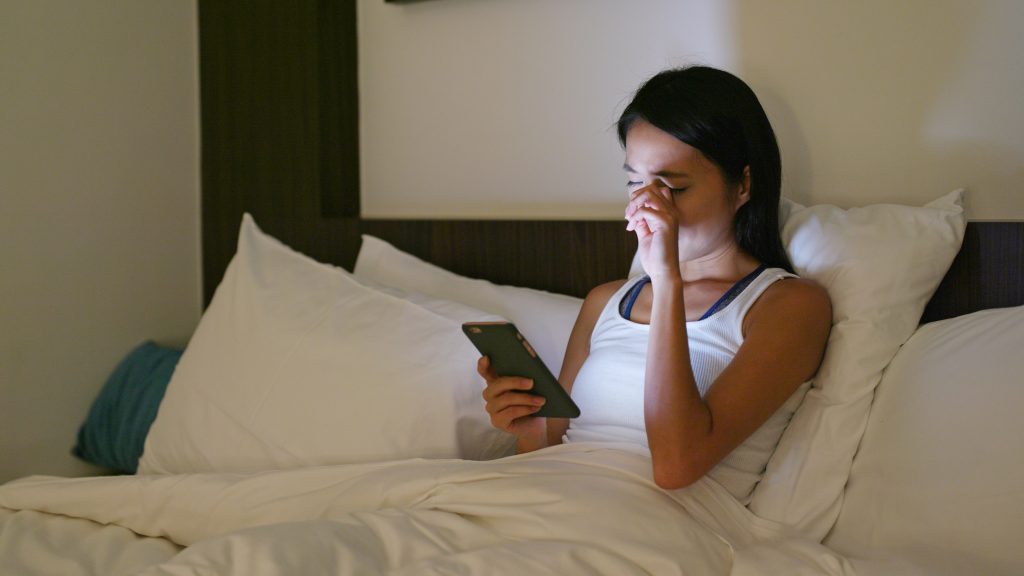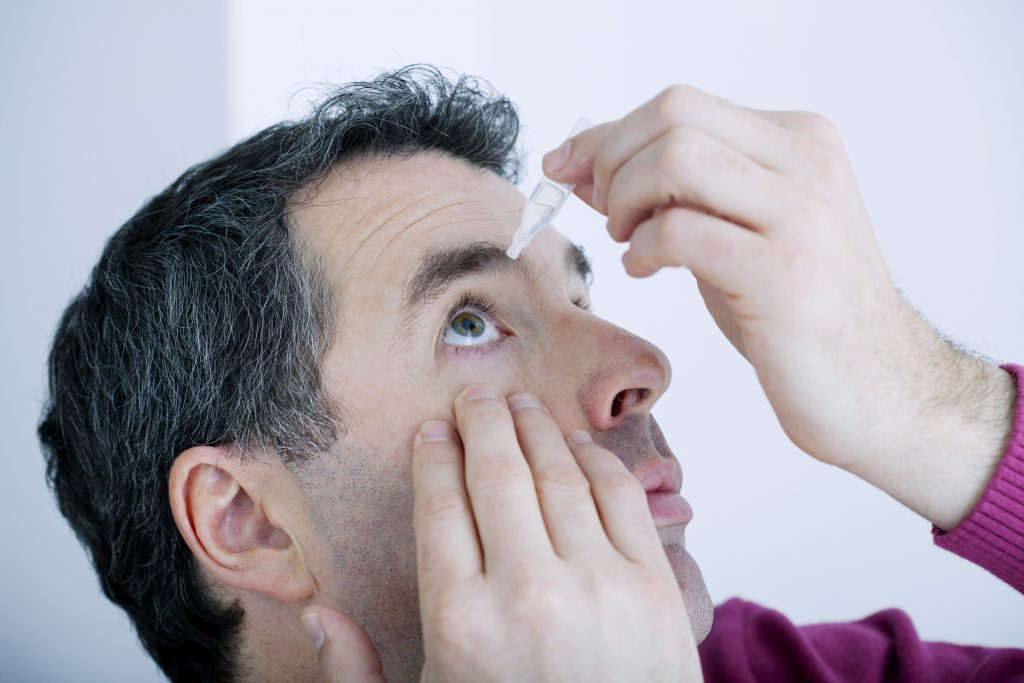July 6, 2021
Why Are My Eyes So Dry?
Dry eye disease is a common condition that can cause eye pain and gradually progress to impaired vision when not treated. Taking steps to prevent and treat dry eyes can help you maintain healthy eyes and avoid permanently damaging your eyesight.
Continue reading to learn more about the symptoms and causes of dry eye and relieving dry eyes should you develop this condition.
What Is Dry Eye?
Dry eye occurs when you cannot produce enough tears, or the produced tears remain too poor in quality to properly lubricate your eyes. Dry eyes often cause pain and discomfort, as well as a burning or stinging sensation.
 “7% of the U.S. adult population have been diagnosed with dry eye disease. Dry eye can be a normal symptom experienced by many patients at some point in their life. Often eyes can feel uncomfortable in windy conditions, places with low humidity, and areas that are air conditioned,” says Alyssa Brion, PA-C a physician assistant with Healthcare Associates of Texas.
“7% of the U.S. adult population have been diagnosed with dry eye disease. Dry eye can be a normal symptom experienced by many patients at some point in their life. Often eyes can feel uncomfortable in windy conditions, places with low humidity, and areas that are air conditioned,” says Alyssa Brion, PA-C a physician assistant with Healthcare Associates of Texas.
Over time, dry eye can lead to inflammation that damages the surface of the affected eye. Complications that may arise from dry eye include infection, vision loss, and reduced quality of life.
“Consequences of going without treatment for dry eye can range from irritation to permanent eye damage,” Brion emphasizes.
Treating dry eyes early on may prevent these complications and allow you to address the root cause of this condition.
What Does Dry Eye Feel Like?
Dry eye disease usually affects both of your eyes. Your eyes will usually continue to feel dry regardless of how many times you blink to encourage lubrication.
Dry eye may also produce the following symptoms:
- Eye redness
- Feeling like something is in your eyes
- Stinging, scratching, and burning sensation
- Watery eyes, due to constant irritation
- Blurred or double vision
- Eye fatigue
- Stringy mucus that leaks from your eyes
- Sensitivity to light
- Difficulty driving at nighttime
- Difficulty wearing contact lenses
According to Brion, “symptoms associated with dry eye disease may also include: eyes that feel gritty, painful/ sore eyes, limited performance in reading, working with computer screens, and watching TV.”
What Causes Dry Eyes?
Dry eyes can result from a range of underlying conditions that affect tear production or increase tear evaporation.
Aging, autoimmune conditions, and hormone imbalances can reduce tear production to cause dry eyes. In addition to the nerve damage caused by laser eye surgery or contact lenses, medications including antidepressants, oral antihistamines, and birth control pills can also affect tear production.
Increased tear evaporation typically occurs when your meibomian glands become clogged. The meibomian glands are the glands located at the edges of your eyelids that produce the oils that lubricate your eyes. Rosacea, lack of vitamin A, prolonged exposure to smoke and wind, and long periods between blinking are all factors that can lead to clogged meibomian glands and increased tear evaporation.
Certain factors may increase your risk of developing dry eye disease. These risk factors include:
- Being at least 50 years old
- Being female
- Having vitamin A deficiency
- Wearing contact lenses
- Having a history of refractive eye surgery, such as LASIK
Brion lists more potential causes of dry eye disease:
- Allergy medications, anticholinergics, estrogens, istretinoin, selective serotonin reuptake inhibitors (SSRIs), amiodarone, nicotinic acid, certain ocular medication.
- History of corneal refractive surgery
- Systemic diseases: Diabetes Mellitus, Sjogren’s Syndrome, Parkinson disease
- Decreased corneal sensation
- Eye lid abnormalities
Why Do I Wake Up With Dry Eyes?
 If you experience dry eyes only for a brief period after you wake up, you may have a condition called nocturnal lagophthalmos. Nocturnal lagophthalmos is when your eyelids fail to remain closed as you sleep, most likely caused by having a weak facial nerve.
If you experience dry eyes only for a brief period after you wake up, you may have a condition called nocturnal lagophthalmos. Nocturnal lagophthalmos is when your eyelids fail to remain closed as you sleep, most likely caused by having a weak facial nerve.
“If the patient knows they didn’t get enough sleep or quality sleep, this may be the cause. However, if it is not associated with sleep, it may need further evaluation. Potentially the patient’s eyelids may not be closing completely, or it may be a systemic cause of dry eye as well,” says Brion.
Bell’s palsy and trauma to the jaw or skull are examples of conditions that can cause facial nerve weakness and nocturnal lagophthalmos. If you frequently have dry eyes upon waking, ask your doctor about artificial teardrops and other treatments to help you find relief.
Why Are My Eyes So Dry and Itchy?
Dry eyes that are also itchy and watery may indicate that you have allergies. Common allergens that trigger dry eyes are pet dander, pollen, and dust mites.
Talk to your doctor about allergy treatments that can help reduce your symptoms. Your doctor may prescribe antihistamine eye drops to relieve your dry eyes.
Can Allergies Cause Dry Eyes?
Allergies may eventually cause dry eye disease, especially among those who use oral antihistamines, which can dry out the eyes. If you only suffer from eye allergies, your doctor may prescribe antihistamine eye drops; this reduces the risk of dry eye disease caused by oral antihistamines.
Can Dry Eyes Cause Floaters?
Dry eyes may cause some people to see floaters, which are spots in your vision that look like dark specks, squiggles, and strings that drift around, then quickly dart away when you try looking directly at them. Like dry eye disease, floaters are also common in people aged 50 and older.
“Floaters are common and not necessarily a cause for concern. If accompanied by other symptoms or new in onset, it is best to be evaluated by a medical professional to help determine level of concern,” Brion adds.
Can Dry Eyes Cause Blurry Vision?
Blurred vision remains a common symptom of dry eye disease. However, blurred vision also remains a symptom of many other eye and medical conditions, such as:
- Nearsightedness (myopia)
- Farsightedness (hyperopia)
- Astigmatism
- Migraines
- Cataracts
- Pregnancy
Visit your doctor to receive a proper diagnosis if you experience blurred vision, as dry eyes represent only one of the many possible related medical conditions.
Can Dry Eyes Cause Double Vision?
Double vision and blurred vision are common symptoms of dry eye disease due to the way tearing becomes impaired with this eye condition. Make an appointment with your doctor to receive an evaluation and proper diagnosis if you frequently experience double vision.
Can Dry Eyes Be Cured?
There exists no permanent cure for dry eye disease. However, you can take many steps to reduce and prevent your risk for this condition:
- Use a humidifier to add moisture to dry indoor air, especially during the fall and winter when the air tends to be dryer.
- Avoid exposing your eye to direct air from hairdryers, air conditioners, and fans.
- Wear sunglasses and protective eyewear when spending extended periods outdoors in windy conditions.
- Rest your eyes frequently by taking breaks to look away when reading and doing other tasks that require extended periods of visual concentration.
- Avoid exposure to secondhand smoke.
- Lubricate your eyes frequently with eye drops as needed, such as on airplanes and at high altitudes where the air may contain less moisture.
Brion says, “If a reversible cause is identified, dry eye may be resolved by removing offending agents/ treating systemic disease. If the cause is not reversible, it may not be able to be cured, however, there are treatments available.”
How To Treat Dry Eyes
Treatments for dry eye disease usually involve treating the medical condition contributing to dry eyes. For example, treatment for dry eyes caused by lack of vitamin A in your diet includes increasing your intake of foods that contain vitamin A such as eggs, dark leafy greens, and fatty fish.
“Usually treatment begins with tear supplementation (drops, gels, ointments), environmental coping strategies (ensuring adequate sleep, medication management, humidifier, frequent blinking), treating eyelid abnormalities, warm compress. If initial measures are not adequate, this would be the time for ophthalmologic evaluation,” Brion advises.
 These are other recommended ways to fix dry eyes:
These are other recommended ways to fix dry eyes:
- Use over-the-counter eye drops or artificial tears if you have mild or occasional dry eye.
- Ask your doctor about prescription medications that can reduce dry eye symptoms. Antibiotics, corticosteroids, and cholinergic (a drug that increases tear production) represent medications typically used to treat dryness.
- Wear contact lenses designed for people with dry eye disease.
- Wear a warm compress over your eyes to unclog blocked oil glands.
- Wash your eyelids regularly using mild soap to reduce inflammation.
When Is It Time to See a Doctor
Make an appointment with your doctor if your dry eyes persist and do not go away, especially if you are also experiencing redness, irritation, pain, and eye fatigue.
Brion says, “If dry eye is accompanied by other symptoms, is painful, progressing in severity, over the counter regimens have not worked, or in general if the patient is concerned about their dry eye, it is time to be seen by a medical professional.”
Your doctor can perform an evaluation and run tests to properly diagnose your condition or refer you to an eye specialist.
Follow us on social media! Facebook, Instagram, Twitter, YouTube.
DISCLAIMER
The information featured in this site is general in nature. The site provides health information designed to complement your personal health management. It does not provide medical advice or health services and is not meant to replace professional advice or imply coverage of specific clinical services or products. The inclusion of links to other web sites does not imply any endorsement of the material on such websites.
